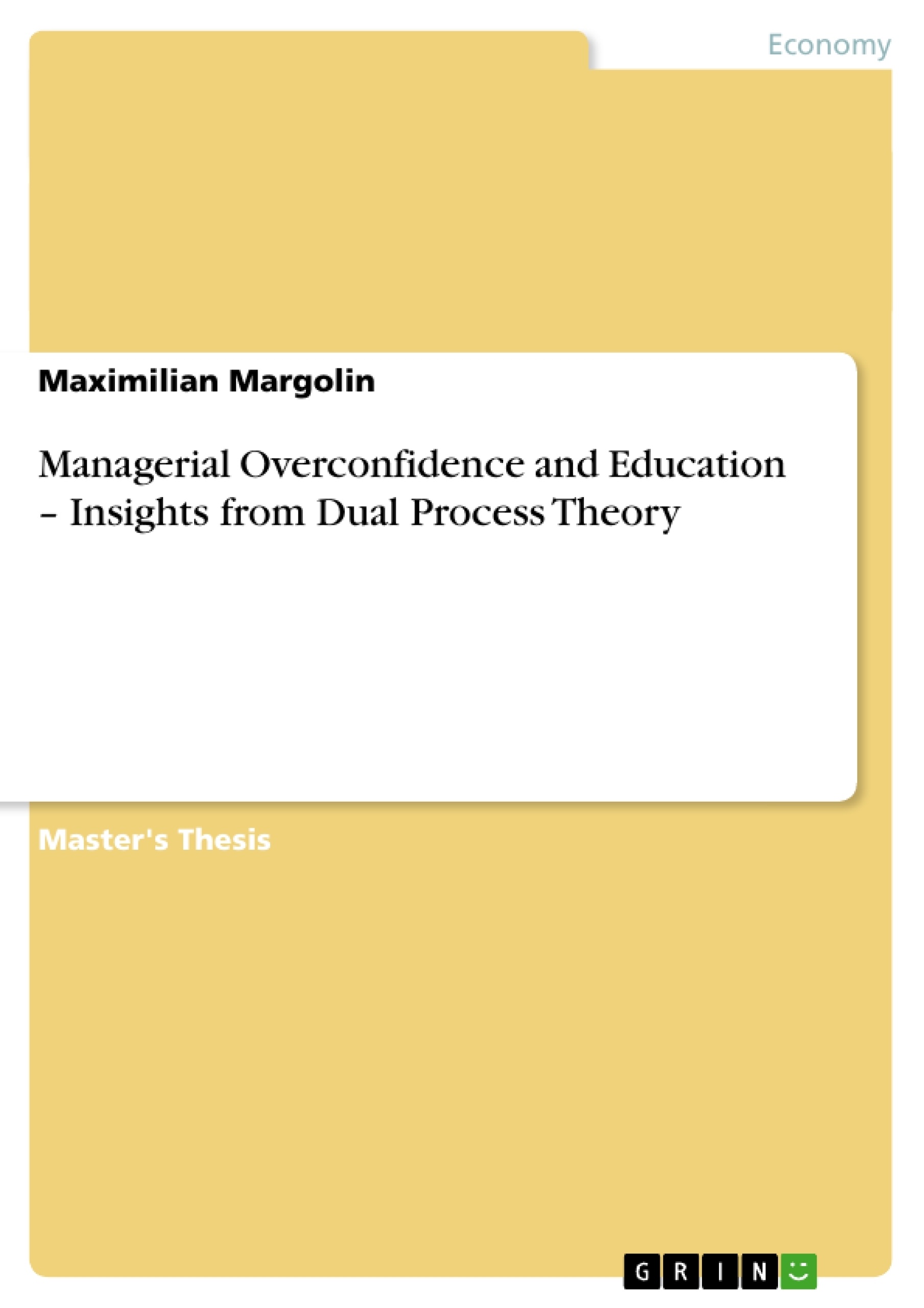Based on data from German DAX-CEOs in this thesis it is argued, that in different fields of education individuals acquire different mind-sets which influence their proneness to overconfidence.
Using the framework of dual process reasoning it is proposed that education in quantitative fields, such as mathematics or physics, hampers overconfidence while individuals educated in qualitative fields, such as law or the humanities, become more prone to overconfidence.
Inhaltsverzeichnis (Table of Contents)
- Introduction
- Purpose of this Paper
- Course of Investigation
- Concept of Overconfidence
- Theoretical Concept
- Managerial Overconfidence
- Criticism
- Sources of Overconfidence
- Principal Sources
- Influencing Factors
- Age
- Education
- Gender
- Cultural Background
- Task Familiarity and Performance
- Feedback
- Importance of a Topic
- Mental Condition
- Situational Factors
- Implications of Overconfidence
- Better-Than-Average Effect
- Implications for Finance
- Implications for Security Trading
- Implications for M&A
- Implications for Corporate Investment
- Implications for Entrepreneurship
- Implications for Management
- Implications for Economics
- Motivation for my Research
- Empirical Evidence
- Data
- Results
- Experimental Evidence
- Data
- Results
- Dual Reasoning and Overconfidence
- Concept of Dual Reasoning
- Differences in Reasoning
- Fixed Factors
- Trainability
- Manipulability
- Reasoning Systems and Overconfidence
- Differences in Training and Overconfidence
- Experimental Approach
- Hypothesis
- Preliminary Considerations
- Experimental Setup
- Additional Testing
- Interpretation of Results
- Conclusion
- Summary
- Outlook
Zielsetzung und Themenschwerpunkte (Objectives and Key Themes)
This master thesis aims to investigate the relationship between managerial overconfidence and education, utilizing insights from dual process theory. The research delves into the concept of overconfidence, its sources, and implications across various fields, including finance, entrepreneurship, and management. Key themes explored in the thesis include:- The concept of overconfidence and its theoretical underpinnings
- The influence of education on managerial overconfidence
- The impact of overconfidence on decision-making in different domains
- The role of dual process theory in explaining overconfidence
- The implications of overconfidence for various stakeholders, including investors, entrepreneurs, and managers
Zusammenfassung der Kapitel (Chapter Summaries)
The first chapter introduces the purpose and scope of the paper. The second chapter delves into the theoretical concept of overconfidence, focusing on its definition, manifestation in managerial settings, and critiques. Chapter three examines the sources of overconfidence, exploring various influencing factors such as age, education, gender, cultural background, task familiarity, feedback, and situational factors. The fourth chapter discusses the implications of overconfidence, covering its impact on areas such as the better-than-average effect and its ramifications for finance, entrepreneurship, and management.
Chapter five presents the motivation for the research, discussing empirical and experimental evidence related to the relationship between education and overconfidence. Chapter six introduces dual process theory as a framework for understanding overconfidence, highlighting the concept of dual reasoning, its differences, and its connection to overconfidence. Chapter seven outlines the experimental approach used in the study, including the hypothesis, preliminary considerations, experimental setup, additional testing, and interpretation of results.
Schlüsselwörter (Keywords)
This master thesis focuses on the interplay between managerial overconfidence, education, and dual process theory. Core concepts include overconfidence, its sources and implications, decision-making, dual reasoning, and the potential impact of education on overconfidence levels.Frequently Asked Questions
How does education influence managerial overconfidence?
The thesis argues that different fields of education create mindsets that affect overconfidence. Quantitative fields (math, physics) may hamper it, while qualitative fields (law, humanities) may increase proneness to it.
What is Dual Process Theory in the context of overconfidence?
Dual process theory suggests that human reasoning involves two systems. The thesis uses this framework to explain how different types of training and reasoning styles impact overconfidence levels.
What are the common sources of overconfidence?
Key influencing factors include age, gender, education, cultural background, task familiarity, and situational factors like feedback and the importance of the topic.
How does overconfidence impact financial decision-making?
Overconfidence has significant ramifications for security trading, mergers and acquisitions (M&A), and corporate investment strategies, often leading to biased risk assessments.
What is the "Better-Than-Average Effect"?
It is a common manifestation of overconfidence where individuals tend to overestimate their own qualities and abilities relative to others, frequently observed in managerial settings.
- Quote paper
- B.Sc. Maximilian Margolin (Author), 2012, Managerial Overconfidence and Education – Insights from Dual Process Theory, Munich, GRIN Verlag, https://www.grin.com/document/209231



